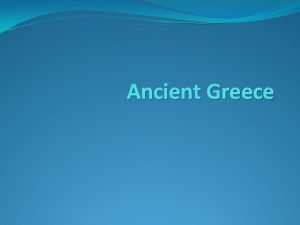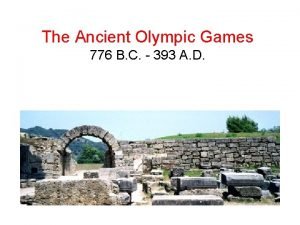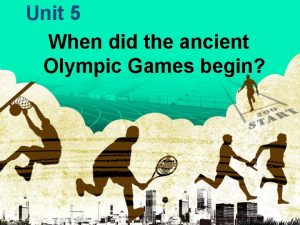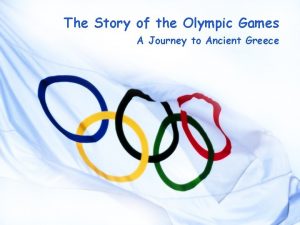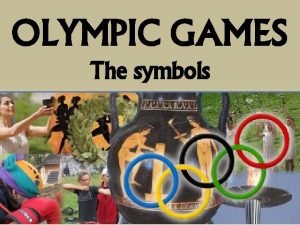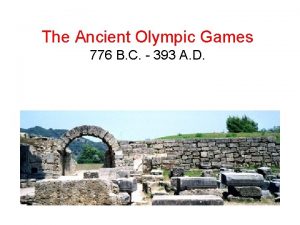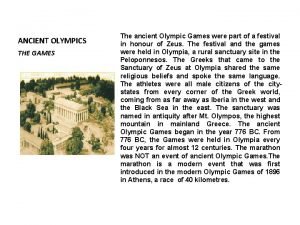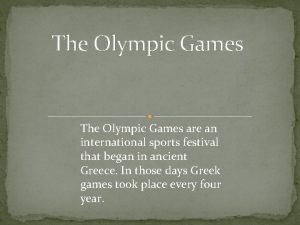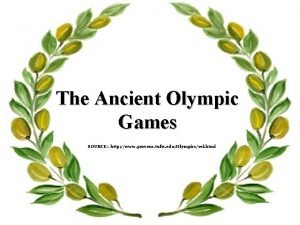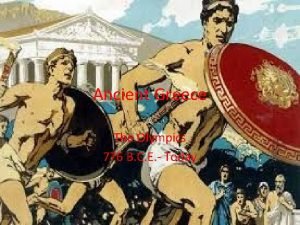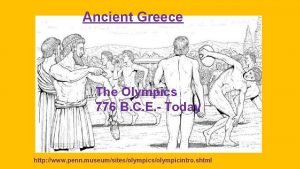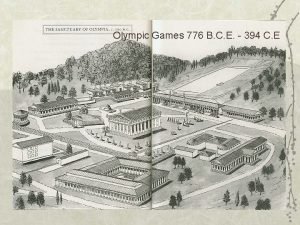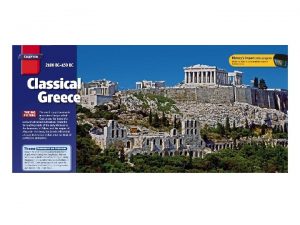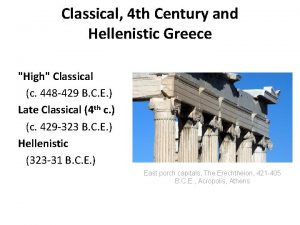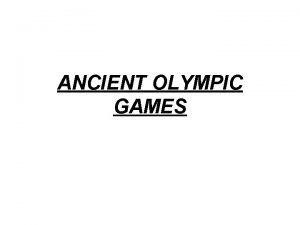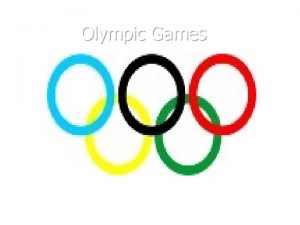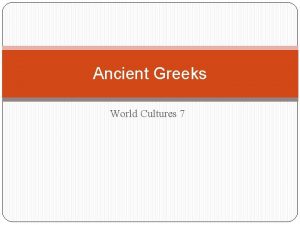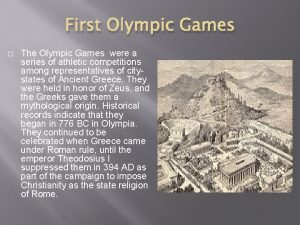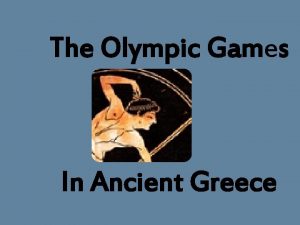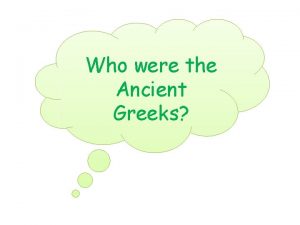The Greeks and the Ancient Olympic Games 776




























- Slides: 28

The Greeks and the Ancient Olympic Games 776 (1, 000) B. C. E. – 394 A

The Greeks (A little background) • The Minoan civilization controlled the Aegean sea and the lands it touched for 1, 600 years. • About 1, 400 B. C. E. the Mycenaean people became the dominant culture in that same region. • Some two hundred years later, they attacked and destroyed Troy. • As the Dorian people gradually conquered Mycenaean controlled lands, the region entered what is now known as the “Dark Ages” or the Homeric Age of Greek history.

Homeric Age 1, 200 B. C. E. – 700 B. C. E. • The earliest documented literature is the work of a blind Greek writer. • The Iliad and The Odyssey (~850 B. C. E. ) provide a very revealing window into the lives, believes and culture of the early Greeks.

Homeric Age 1, 200 B. C. E. – 700 B. C. E. • In the Iliad, Homer provides the earliest known account of sport competition as he describes the “funeral games” initiated by Achilles in memory of his warrior friend, Patroclus.

Classical Humanism • Greek gods thought of as ideal humans – Anthropomorphic – Depicted as having magnificent bodies (Zeus, Apollo, Athena, etc. ) • Greeks wanted to resemble their gods – Sought to train and develop the body

The Early Athenian Period 776 B. . C. . E. . – 480 B. . C. . E • The Ancient Greek’s emphasis on the importance of a strong and fit body is best demonstrated by the Ancient Olympic games. • What started as a stadion race in 776 B. C. (single course sprint event) evolved by 520 B. C. into several running, combat, and combined events spread over five days of Olympic competition.

The Spartan Period • The Spartans were a small (5, 000 – 9, 000) yet dominant military force for several centuries. • As many as a quarter million helots (slaves) maintained the Spartan economy, while Spartan males devoted their life (age 7 – 50) to military training and service.

The Spartan Period • In war time and during the peaceful Olympic Games, the Spartans best represented the “All for one, and one for all” concept. • The purpose of their existence was to serve and protect Sparta. • In 480 BCE King Leonidas, and his 300 royal guards, fought Xerxes, King of Persia, at Thermopylae to the last man.

Ancient Olympics • What may have originated as a religious tribute to Zeus around 1, 000 B. C. E. in the small town of Olympia on Mt. Olympus, later became the celebration of the ancient Olympic Games.

Greek Sport • First known record of ancient Olympic Games (776 B. C. E) – Originated from Funeral • Games in honor of the deceased and the worship of their Gods. – Climate in Greece allowed for physical activity year round

Who could compete? • Male citizens of one of the many Greek city states with no criminal record and who swore they had trained for at least ten months prior competition were eligible to compete in the Ancient Olympic Games.

Who controlled the Games? • From the very beginning, the city of Elis (30 miles to the north) and the small neighboring town of Pisa were engaged in disputes over the control of the Sanctuary of Zeus at Olympia • Those who controlled the Games had prestige, economic advantages and, most importantly, political influence.

Paxa Olympica- Olympic Truce • The Olympic Games’ organizer city-state of Elis instituted Paxa Olympica to protect against military incursions which interrupted the Games. • Every four years, special heralds from Elis were sent out to all corners of the Greek world to announce the approaching Olympic festival and games. • Along with this news, they would announce the Olympic Truce, which protected athletes, visitors, spectators and official embassies who came to the festival from becoming involved in local conflicts.

Politics and the Ancient Olympics • In 665 BC, according to Pausanias (a 2 nd century AD Greek traveler), Pheidon, the powerful tyrant of Argos was asked by the town of Pisa to capture the Sanctuary of Zeus from the city-state of Elis. • Pheidon, with his army well-trained hoplites (armed soldiers), marched across the Peloponnesos, secured the Sanctuary for the town of Pisa, and personally presided over the conduct of the games. • But Pisa's control of the Sanctuary was brief: by the next year Elis had regained control. http: //www. upenn. edu/museum/Olympics/olympicpolitics. html

Example: • Perhaps the most notable example of a military incident occurring during the ancient Olympic Games was in 364 BC. In that year, Elis had again lost control of the Sanctuary of Zeus to the neighboring town of Pisa which was directing the festival and the Olympic Games. Elis chose precisely this time to attack the Sanctuary of Zeus. Xenophon, a contemporary 4 th century historian, gives us a firsthand account of the situation: The horse race had been completed, as well as the events of the pentathlon which were held in the dromos. The finalists of the pentathlon who had qualified for the wrestling event were competing in the space between the dromos and the altar. . . The attacking Eleans pursued the allied enemy. . . The allied forces fought from the roofs of the porticos. . . while the Eleans defended themselves from ground level. Hellenica • http: //www. upenn. edu/museum/Olympics/olympicpolitics. html

Ancient Olympics: Rules • Chariot Races – The owners of the horses were declared the winners. • Wrestling – No weight limits • Boxing – No weight limits

Ancient Olympics: Rules • Pankration – No weight limits; punching, kicking, choking, finger breaking, and blows to the genitals were allowed; only biting and eye gouging were prohibited

Ancient Olympics: Rules • Foot races – False starting in a race brought whipping; longer races required the runner to make an 180 degree turn around a post. • Hoplitodromos – a footrace requiring the runners to wear helmets, greaves, and a shield.

Ancient Olympics: Rules • Javelin - When throwing for distance the javelin had to fall within an area defined on three sides, and the throw was invalid if it fell outside this area.

Ancient Olympics: Rules General Rules • Lying, bribing, and cheating were heavily fined • The Olympic Games' organizer city-state of Elis instituted Paxa Olympica (Olympic Truce) to protect against military incursions • Free Greek citizens could participate except women, slaves, and the very young http: //www. fjkluth. com/olympic. html

Ancient Olympics: Rules • Once admitted participants could not resign or withdraw • Any athlete who was left over without an opponent had the right to compete with the winner of the second round (“bye”) • Those who had committed crimes or had robbed a temple (criminals) were also excluded from the games http: //www. fjkluth. com/olympic. html

From Ancient to Modern Olympics • The first known record of the Ancient Olympic Games traces back to 776 B. C. • Koromikos, a cook from the city of Ellis, won the stadium race (600 feet). • By 393 AD, the time Emperor Theodosius II abolished the pagan Greek Olympics, over 290 Olympic Games had been held.

The Olympic Flame • The idea of the Olympic Torch/ Flame was first inaugurated at the 1932 Olympic Games in Los Angeles. • The design of the L. A. coliseum included a facility for a large flame. • The modern Olympic torch relay was first instituted at the 1936 Nazi Olympic Games in Berlin.

The Olympic Oath "In the name of all competitors, I promise that we shall take part in these Olympic Games, respecting and abiding by the rules that govern them, in the true spirit of sportsmanship, for the glory of sport and the honour of our teams. “ (Baron de Coubertin) • In 1920 at the Antwerp Olympic Games, Belgian fencer Victor Boin became the first athlete ever to take the Olympic Oath on behalf of all athletes. •

Was the Marathon race an Ancient Olympic event? • The marathon was NOT an event of the ancient Olympic games. • The marathon is a modern event that was first introduced in the Modern Olympic Games of 1896 in Athens, a race from Marathon northeast of Athens to the Olympic Stadium, a distance of 40 kilometers (25 miles).

The Origins of Modern Olympics’ Marathon Race • The race commemorates the run of Pheidippides, an ancient "day-runner" who carried the news of the Persian landing at Marathon to Sparta (a distance of 147. 2 miles) in order to enlist help for the battle. .

The Origins of Modern Olympics’ Marathon Race • According to the fifth century B. C. ancient Greek historian Herodotus, Pheidippides delivered the news to the Spartans the next day. • He then ran back to Athens with the Spartan's reply - which was that due to observances they could not leave Sparta until the full moon.

The Origins of Modern Olympics’ Marathon Race • The Athenians decided not to wait and attacked the Persians at Marathon. • Pheidippides ran 25 miles back to Athens from Marathon to deliver the news of a Greek victory. • In less than one week he ran 300+ miles on a very rough terrain with hardly any rest. • Upon his arrival to Athens he declared “Nike!” (Victory!) and died.
 Olympic games in greece 776 b c
Olympic games in greece 776 b c 393 ad olympic games
393 ad olympic games Ancient greek olympics opening ceremony
Ancient greek olympics opening ceremony Ancient olympic games
Ancient olympic games Ancient olympic games
Ancient olympic games The olympic sports
The olympic sports Citius, altius, fortius means
Citius, altius, fortius means The ancient olympic games were initially
The ancient olympic games were initially Ancient olympics javelin
Ancient olympics javelin What did the greeks value
What did the greeks value Difference between geocentric and heliocentric models
Difference between geocentric and heliocentric models Olympic powerpoint template
Olympic powerpoint template The olympic games are an international sports festival
The olympic games are an international sports festival Olympics purpose
Olympics purpose Class five english
Class five english Modern olympic games ppt
Modern olympic games ppt First olympic held in
First olympic held in Olympic games athens
Olympic games athens The olympic games is an international reading answers
The olympic games is an international reading answers Annaliisa jäme
Annaliisa jäme The zappian
The zappian Romans and greeks
Romans and greeks Romans and greeks
Romans and greeks 776 b.c.e
776 b.c.e Ancient olympics vs modern olympics venn diagram
Ancient olympics vs modern olympics venn diagram 776 bce
776 bce Types of games outdoor
Types of games outdoor Who were the persians
Who were the persians Which statement is accurate?
Which statement is accurate?
